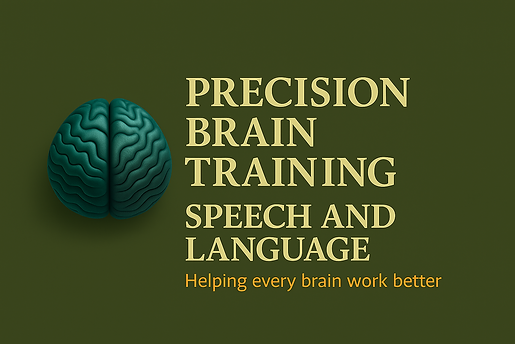
Interactive Metronome® for Speech & Language Disorders
Train the Brain to Speak, Process, and Respond with Precision
Communication is one of the most complex tasks the brain performs—it requires timing, rhythm, motor coordination, and cognitive processing to all work together. When this internal timing system is out of sync, speech and language abilities often suffer.
Interactive Metronome® (IM) is a brain-based therapy that strengthens the neural timing network responsible for speech production, auditory processing, language comprehension, and expressive communication. It is a powerful tool for both children and adults with communication difficulties.
IM Targets the Timing Behind Communication
Whether someone is struggling to say words clearly, understand spoken directions, or put thoughts into sentences, there’s often a disconnect in the brain’s timing system—particularly in areas involving auditory-motor integration and cognitive control.
IM helps resynchronize these systems by using movement-based exercises paired with auditory and visual feedback to strengthen communication pathways in the brain.
Conditions That Can Benefit from IM Speech-Language Support:
-
Childhood Apraxia of Speech (CAS)
-
Aphasia (from stroke or brain injury)
-
Auditory Processing Disorder (APD)
-
Language-Based Learning Disabilities
-
Developmental Language Disorder (DLD)
-
Articulation or phonological delays
-
Expressive/Receptive language challenges
-
Fluency and rate control (cluttering/stuttering)
The Science: Why Timing and Rhythm Matter
Speech and language production depends on precise timing between motor, auditory, and cognitive regions of the brain. When neural timing is off—even by milliseconds—it disrupts:
-
Word retrieval
-
Speech sound production
-
Auditory memory and discrimination
-
Language comprehension
-
Sentence formation and storytelling
Interactive Metronome trains the brain to work in synchrony by improving temporal processing, which is critical for processing rapid speech sounds, decoding language, and forming responses.
Brain Areas Stimulated by IM:
Brain Area Role in Communication
Cerebellum Coordinates motor speech (articulation, fluency)
Broca’s AreaWord production and planning
Wernicke’s AreaLanguage comprehension
Prefrontal CortexVerbal working memory and self-monitoring
Temporal LobesAuditory processing and phonemic awareness
Improving timing in these regions helps the brain send clearer messages—and receive them too.
Pediatric Language Outcomes
Children using IM as part of their speech therapy often show improvements in:
✔️ Attention and listening during sessions
✔️ Sound sequencing and articulation
✔️ Language organization (storytelling, conversations)
✔️ Following multi-step directions
✔️ Processing speed and expressive vocabulary
✔️ Reduced frustration and increased confidence
Adult Speech & Aphasia Support
For adults with aphasia, brain injury, or speech motor deficits, IM helps rebuild foundational brain timing skills needed for:
✔️ Word finding
✔️ Rhythm of speech
✔️ Articulation control
✔️ Sentence fluency
✔️ Auditory comprehension
✔️ Communication confidence
Speech-Language Goals IM Supports
Whether used alone or in collaboration with a speech-language pathologist (SLP), IM strengthens:
-
Auditory attention & working memory
-
Motor speech coordination (oral-motor control)
-
Verbal reasoning & sequencing
-
Auditory discrimination & phonological awareness
-
Rate, rhythm, and flow of speech
Testimonials
“We paired IM with speech therapy, and my son went from barely putting two words together to telling full stories.”
— Parent of 6-year-old with apraxia
“After my stroke, I couldn’t find the right words. IM helped my brain reconnect, and I’m speaking more clearly every week.”
— Aphasia client, age 58
Integrated, Brain-Based Support
Interactive Metronome works beautifully alongside speech therapy or as a standalone neuro-motor training approach. Our clinic builds custom programs based on your or your child’s needs.
What Makes Our IM Program Different?
-
Trained in neuromotor speech timing
-
Customized protocols for apraxia, aphasia, and auditory challenges
-
Supportive environment for non-verbal, emerging, or struggling speakers
-
Sensory-friendly and trauma-informed adaptations available
-
Measurable timing data to track real progress
Let’s Work Together
Get in touch so we can start working together.